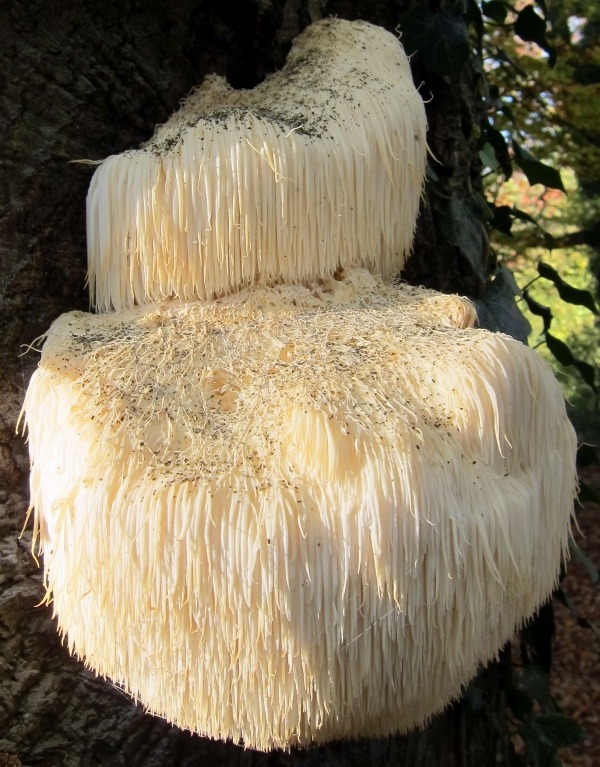So what is lion’s mane mushroom good for?
I’d like to say that it’s such a great natural nootropic that it’s a ‘magic mushroom’, but that might give some people the wrong idea.
Let’s just say that it’s a ‘miracle mushroom’ instead, shall we?
Basically, lion’s mane mushroom is revered for its’ ability to encourage the growth of new brain cells.
This capacity naturally leads to improvements in memory & overall cognition, but the good news doesn’t stop there.
Lion’s Mane is also very effective at preventing the onset of degenerative neurological disorders, like Alzheimer’s and dementia.
Last but not least, Lion’s Mane can boost the immune system, help reduce feelings of anxiety, and alleviate the symptoms of depression.
Monks in Asia have used Lion’s Mane in tea for thousands of years to heighten awareness, and neuro-hackers today are using it to maximize their productivity.
So, let’s find out more about this mighty fungus, shall we?
Lion’s Mane Mushroom – Where’s it from?
Lion’s Mane is cultivated in Asia, North America, and Europe.
It grows naturally in woodland areas on tree stumps, and can also thrive easily in a lab, or on a culture plate.
In fact, there are numerous websites you can visit that will show you how to produce Lion’s Mane at home.
They even have culture kits you can purchase if that’s your thing.
The Latin or ‘scientific nomenclature’ for Lion’s Mane is ‘Hericeum Erinaceus’. Some other common names are Monkey’s Head, Hedgehog Mushroom, and Satyr’s Beard.
The active ingredients responsible for the regenerative benefits of Lion’s Mane are Hericenones and Erinacines.
Hericenones and Erinacines both encourage the production of Nerve Growth Factor (NGF), which in turn promotes the growth of new brain cells.
So what practical uses have we found for Lion’s Mane?
Can it help prevent the onset of neurological diseases?
You bet!
Lion’s Mane Mushroom for Alzheimer’s – How does it help?
The erinacines in Lion’s Mane have been proven to be very effective at stopping the buildup of amyloid plaques at neuroreceptor sites.
Amyloid plaques are proteins that can build up at the synapses and interfere with the transmission of nerve signals in the brain.
Amyloid plaques are very closely associated with the onset of Alzheimer’s disease. Where you find one, you usually find the other.
Traditional drug therapies for Alzheimer’s have proven ineffective once the disease takes hold, so recent research has focused more on prevention.
Lion’s mane might also prove effective for Parkinson’s disease, dementia, and brain cell death due to ischemic stroke.
Furthermore, it has large amounts of a very potent antioxidant called Beta-Glucoxylan, which can help block tumor growth.
Lion’s Mane Benefits – How does it Improve Brain Health?
I know this may seem repetitive at this point, but I think it bears repeating; the main advantage of Lion’s Mane Mushroom is neural regeneration.
You should be given fair warning: I am about to get up on a soap box. We all do it from time to time, so please don’t judge me too harshly.
The importance of neural regeneration to improving brain function simply can’t be overstated.
Lion’s Mane for Nerve Growth – Can it Perform Miracles?
I took advanced courses in biology and chemistry in high school.
The instructor told us that theoretically, we had the capacity to regrow lost limbs and other body tissues, except for one thing.
Scientists still hadn’t figured out how to grow new nerve tissue.
Stem cell research was still in its’ infancy at the time, so unfortunately, we still didn’t have a viable solution.
He also told us that once toddlers reach the age of 2 or 3 years old, nerve tissue in the body stops reproducing.
This seemed to make sense to me at the time, because one fateful winter, I had gotten frostbite on one of my toes.
I could stab a needle through it right now if I wanted to, and I wouldn’t feel a thing.
Currently, growing usable nerve tissue in a petri dish is still an idea that belongs in science fiction stories.
However, there is a silver lining here…
Lion’s Mane for the Brain – Where’s the Science at Now?
We can’t grow nerve tissue artificially, but what about neurons?
The consensus now is that while new nerve tissue in the body ceases to grow at the age of 2 or 3, our brain cells do in fact regenerate throughout our lifetime.
This makes sense; if they didn’t, wouldn’t we all turn into zombies by the time we were teenagers?
The truth is, the real issue is that the rate of reproduction slows down as we age.
Furthermore, our brains can accumulate debris like amyloid plaques, or have other issues over time.
The best way to mitigate all of these hazards is to nourish our neurons so they can rejuvenate themselves naturally.
That’s exactly what Lion’s Mane mushroom is good for! That’s what it can do for you!
OK. So I’m going to get off my soap box now.
I hope I didn’t bore you to death!
Now let’s take stock of the advantages Lion’s Mane offers as a brain booster, shall we?
Lion’s Mane Mushroom Nootropic Benefits – Let’s get Specific!
The implications of being able to regrow brain cells are very far-reaching; in a good way.
Lion’s Mane Mushroom is good for:
- Memory
- Mental Flexibility
- Improved Learning
- Anxiety
- Depression
- Boosting Immunity
- Neuroprotection
Replacing old brain cells and ensuring there is no gunk at the synapses results in better neuroplasticity.
Neuro-hackers using Lion’s Mane often experience easier recall of information and an accelerated capacity to learn new skills.
Their reasoning ability is also enhanced, allowing them to make better decisions without hesitation or confusion.
This in turn leads to more confidence, less anxiety, and the ability to fight off symptoms of depression.
Preliminary research has also indicated that Lion’s Mane may act as an MAO inhibitor, and encourage the production of Brain-Derived-Neurotropic-Factor(BDNF).
This could explain its’ effectiveness at boosting mood and staving off depression.
Lion’s Mane also contains other constituents that boost immune function and act as antioxidants, shielding the body from free radicals that can cause inflammation and cancer.
Tendencies to let the mind wander are also minimized, indicating that Lion’s Mane may be very good for individuals dealing with ADHD.
Generally speaking, all of these effects are beneficial for anyone suffering from mild cognitive impairment (MCI), so a lot of seniors can benefit from supplementing with Lion’s Mane.
Now that we have an idea as to why we should use Lion’s Mane as a nootropic, let’s think about how to supplement with it for best results.
Lion’s Mane Mushroom Supplements – What are your Options?
Lion’s Mane is available in many forms.
You can grow fresh Lion’s Mane yourself with a cultivation kit, if that’s the route you want to go, and you have the space.
The vast majority of us, however, will get to enjoy our Lion’s Mane as a powder supplement, capsules, extract, or tea.
The powders are the cheapest and most common. You can add them to fruit juice, smoothies, or your cup of coffee in the morning.
Processing techniques vary, but these powders are usually freeze-dried.
Capsules typically have an extract in them to minimize bulk, and should be standardized to contain either 30% or 50% polysaccharides.
Polysaccharides are a type of nutrient that includes hericenones and erinacines; the chief active ingredients behind Lion’s Manes’ regenerative powers.
Extracts will have a ratio assigned to them like 10:1 or 14:1. What this basically means is that 10 ounces of mushroom was processed to produce 1 ounce of extract. So if you do the math, a 14:1 extract is slightly stronger.
The teas are usually available at your favorite health food store, and may be mixed with other herbals to improve the flavor.
The amount of active ingredient in each type of supplement is going to vary considerably, so it’s difficult for me to provide you with any comprehensive advice on dosages.
The best solution I can offer you is to read the label carefully, and take the lowest recommended serving to start.
See how your body reacts, and increase your intake if you think it’s necessary for better results.
Lion’s Mane Mushroom Supplements – How to Find Top Quality Products
When it comes to choosing a good supplement, you really need to be patient and do your own research.
The companies making these products all want to claim that their ingredients are the highest quality.
However, I think the big question here is, how the heck are YOU supposed to know that?
Well, one way is to make sure the product is ‘Certified Organic’, and it gets tested by a neutral 3rd party for safety and effectiveness.
Several supplements will be ‘cGMP Certified’, which stands for ‘Current Good Manufacturing Practices’.
There’s really no iron-clad guarantee, but these are government mandated quality standards, and they’re in place for your protection.
You may as well use them to your advantage.
Personally, I would look for a good extract or raw material product used in capsule form. This is mainly for the convenience factor.
It also let’s you know that your supplement is produced the same way every time.
The recommended dosage for a capsule supplement is 500-2,000 mg/day.
That being said, let’s wrap things up, shall we?
Lion’s Mane Mushroom – Final Recommendations
So what is lion’s mane mushroom good for?
Improved brain health and function, mostly.
Accelerating the speed of brain cell growth causes a cascade of benefits that trickles down to most areas of cognition.
People wanting to eliminate brain fog, perform better at work, do better at school, or just optimize their brain function can all get something out of Lion’s Mane.
That being said, I also think certain people could see more benefit than others from taking Lion’s Mane as a supplement.
They are as follows:
- Seniors
- People with ADHD
- Anyone with a Family History of Neurological Disorders
- Concussion or Head Trauma Victims
- Individuals Struggling with Anxiety or Depression
These folks need what Lion’s Mane is offering, and I would like to see the benefits of Lion’s Mane become common knowledge for their sake.
I sincerely hope that you enjoyed reading this article, because I loved writing it!
Lion’s Mane is absolutely one of my favorite nootropics!
In my next article, I’ll be reviewing a nootropic supplement called Noocube.
Until next time,
Michael
P.S. – Tell your friends!
If you know anyone that could benefit from the healing powers of Lion’s Mane, go ahead and use the social buttons on my site to send it to them!
And as always, if you have any questions, please post a comment!








Hi, excellent article, thank you!
However, there’s just one problem… I hate mushrooms. Like I can’t eat them.
Oddly enough, it’s a trauma thing from grade school and a horrible baby sitter I had. She forced me to eat mushrooms when I didn’t like them in my food at that time, so no matter what, if I taste mushrooms, I can’t eat it. I’ve tried it different ways and it just doesn’t work, even when it DOES taste good. So I was REALLY hoping there were other ways than mixing it with coffee or tea or eating it
Thankfully, supplements!
However, I’m also very leery about supplements. Have you seen the number of recalls on supplements in the US for the manufacturer putting erectile dysfunction drugs like Viagra in ‘male enhancement’ supplements? Freaks me out because the supplements aren’t regulated by the FDA at all until AFTER they are on the market.
I know there is this big hype about ‘all-natural’ versus synthetic or natural supplements versus medication because it’s ‘safer’, but that’s not actually true. People forget that natural products and plants have just as much of a chance of causing an adverse reaction as a medication does!
I have bad reactions to certain things, such as Benadryl. I get headaches from certain spices, even! Heck, too much caffeine and my hands tremble like I’m on crack. So when I try a supplement (AFTER reading scientific studies that it works), I want to try that supplement only, not a supplement mixed with a bunch of other supplements.
I only take multi-ingredient supplements after I know I won’t have a weird reaction, so I don’t feel like I want to be taking Mind Lab Pro. This is also so if I have a reaction, I will know to avoid it in the future in other supplements.
Do you think I would be OK trying the other product from Brain Forza? Sounds like it could work for me, but I’m still not sure. You know?
Thanks for the excellent article!
Hey Selenity,
I think you win the award for the most interesting comment on my site. Thank you for writing in with your concerns!
Since you are very sensitive to stimulants like caffeine, and other medications, you should try the supplement from Brain Forza I recommended. Mind Lab Pro is a great product, and it works for me, but I think you need a single ingredient supplement.
The Lion’s Mane supplement from Brain Forza is very very safe, and comes in smaller doses so you can start taking it gradually to see how you feel.
I really hope that helps, and if you have any question, please don’t hesitate to post another comment.
Michael
Hi Michael,
Thanks for this in-depth article. I did not know any of the information provided, always new that mushrooms are good for you but one needs to be careful, they have a magical side to them. Great soap story.
Regards,
Barry
Hey Barry,
Glad you liked my soap story. I might do more of them in the future.
If you think of any questions concerning the magic of mushrooms, please post another comment.
Michael
Hi Michael,
Very interesting article.
I have had epilepsy since I was 17 years old. I’m 37 now, and what you said about head trauma victims caught my eye.
Can Lion’s Mane mushroom’s help epilepsy sufferers?
It would be great if they could, because even though I use regular medications, I still suffer from seizures every now and then.
Thanks for sharing, and keep up the great work on your site.
All the best,
Tom
Hey Tom,
I’m really happy to see that you enjoyed my post.
In answer to your question, research is being conducted on Lion’s Mane for epilepsy, and the initial findings look promising.
Based on what I have been reading, about 2/3 of people using traditional treatments for epilepsy have good results.
So what about the other 1/3?
That’s why they are doing further studies. You can read more here: https://www.ncbi.nlm.nih.gov/pmc/articles/PMC6413080/
Basically they have found that Lion’s Mane helps protect the Hippocampus from cellular damage during a seizure.
Turmeric has also shown some potential as a natural neuroprotective agent.
Thanks once again for your interest, and if you have any other questions, just give me a holler!
Michael
Hi Michael,
I did not know what nootropics are let alone lion’s mane mushroom.
It’s great to see natural supplements in this category, as typical medicines have long term side effects.
I have heard that once you start taking the traditional medicine, you can’t really stop. These supplements sound like a great alternative to traditional drug therapies.
However, I do have one question. Are there any potential side effects I should be aware of? Or do they have any guidelines on who should not take this?
Thank you,
Rajith
Hey Rajith,
Thank you for giving my article a read. I really appreciate it!
To date, toxicology tests on Lion’s Mane have shown that it does not have any adverse affects. It has been classified as a food product that provides improvements to brain and nerve health.
You can verify my findings by reading this research paper: https://www.ncbi.nlm.nih.gov/pmc/articles/PMC5987239/
There is a toxicology report in Section 5.
That being said, pregnant or breastfeeding moms-to-be should not take Lion’s Mane. We simply do not know if there are any adverse effects for ladies that are expecting at this point. Better to be cautious.
Lion’s Mane has been found to be safe for regular consumption, even past 16 weeks. A very small number of people have experienced mild nausea, and Lion’s Mane may lower blood sugar slightly.
Diabetics or individuals that are hypoglycemic should consult with their doctor before supplementing with Lion’s Mane, just to be safe.
Looking at Mind Lab Pro, and the Lion’s Mane supplement from Brain Forza, the only safety warning I am aware of is for pregnant ladies. You should also avoid taking more than 2,000 mg of Lion’s Mane a day. That’s about it.
I hope I answered all of your questions, and would be happy to answer any others in the future.
Thanks once again for your interest.
Michael